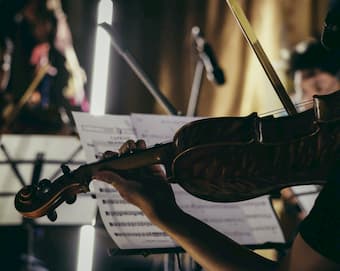“my jump is not high enough, my twists are not perfect, I can’t place my leg behind my ear…..Sometimes there is such an obsession with the technique that this can kill your best impulses. Remember that communicating with a form of art means being vulnerable, being imperfect. And most of the time is much more interesting. Believe me.”
Mikhail Baryshnikov – ballet dancer
Paganini: 24 Caprices, Op. 1 – No. 4 in C Minor: Maestoso (Edson Scheid, baroque violin)

© Julio Rionaldo / Unsplash
Music, like ballet, is a creative, artistic activity, but that creativity must be underpinned by secure technique – a range of mechanical skills, such as how we move our limbs, manage breathing and airflow, or control our embouchure, which enable us to execute musical ideas. These skills are developed and honed over time, and a large proportion of the musician’s training and practice is devoted to fine-tuning and maintaining their technical facility.
Musicians use a variety of means to practice technique, including scales and arpeggios, exercises, etudes and excerpts from the music currently being worked on. Technical skills require consistent nurturing, which is why regular practicing is so important. Mindless note-bashing achieves little; focused, deliberate, deep practice, on the other hand, fosters technical assuredness and artistic mastery.
Through a process of constant reflection and refining during practice, physical and creative obstacles are overcome and one has in place the firm foundations and confidence from which to develop greater artistry. Assured technique also gives us the tools to explore more complex repertoire.
Debussy: 12 Etudes – No. 11. Pour les arpeges composes (For written arpeggios) (Noriko Ogawa, piano)

© iStockphoto.com / Imgorthand
As the ballet dancer Mikhail Baryshnikov says in the quote at the head of this article, “an obsession with technique can kill your best impulses”. The obsessive need to find perfection in one’s technique, coupled with the anxiety of achieving perfect arpeggio runs or intonation, can deaden musical and artistic expression, leading to performances which may be note-perfect and faithful to the score, but lacking in emotional depth and communication. In addition, this quest for technical perfection may lead to over-practicing and even injury. It can also rob us of curiosity and joy in our practicing and music-making.
“The purpose of technique is to free the unconscious.”
–David Mamet, playwright & director
Technique must always serve the music – the two are inseparable – but if one becomes too obsessed with technique alone, one risks overlooking the expressive, communicative and emotional aspects in the music. A willingness to look beyond technique, to accept that perfection is unattainable (because we are all human), leads to greater artistry and imagination in our music-making, and allows us to play “in the moment”, creating performances which are spontaneous, exciting and memorable.
For more of the best in classical music, sign up to our E-Newsletter


